Archive Entries for June 2021
« May 2021 | Main | July 2021 »
Wednesday June 30, 2021
Books in June
- Montmorency by Eleanor Updale [read by Stephen Fry]
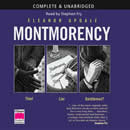
I should say up front that this is a book for "children" - the writing style is, in my opinion, pitched very well for the young. It's easily understandable, educational, and humourous; it talks a lot about sewage and poo - all time favourites among 9 year olds (and those in their 60s if I am anything to go by). However the content and basic themes of the book were criticised as being unsuitable for the young - it was variously recategorised as young adult.
Basically I think it is the somewhat dubious morality of the central character that gives some people a problem. The unvarnished truth is that Montmorency is a (highly skilled) thief and con artist. The author makes him into a Jekyll-and-Hyde type character, going so far as to give his villainous persona a different name to emphasise his low moral character.
I think the book is so cleverly written (and delightfully read by Stephen Fry) that I would definitely give it to my 9 year old - hoping it would encourage a great interest in reading if nothing else - as well as fervently hoping it would not encourage him to try thieving or going down sewers. It has to be said that the most dubious activities of our hero are not what I would call glamourised in any way. And there is quite a good overall moral message in the end, as Montmorency gets to put his talents to good use for Queen and Country, finally able to put his criminal past behind him. - Dead Land by Sara Paretsky [read by Liza Ross]
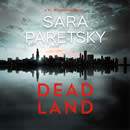
In this story VI becomes involved in the world of the displaced homeless, and the mentally ill. She's not a very willing participant in the action as it stems from her young and impetuous god-daughter's desire to "help" someone (Lydia) who would undoubtedly rather have been left alone. It is only the actions of others towards VI's pragmatic and fairly low key suggestions about social care options that sharpens her interest in the whole affair. Soon she is uncovering very dubious dealings around real estate planning, and ultimately the catastrophic incident which started Lydia's mental decline from a famed singer-songwriter, culminating in living on the streets.
The plot is complex, (involving identity theft which is always potentially confusing), and has a political element; however, the fundamental story revolves around family inheritance, and age-old crimes driven by personal greed - as ever. - The Darkest Evening by Ann Cleeves [read by Janine Birkett]
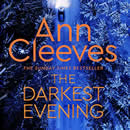
I've been listening to a few Ann Cleeves' books over the past 12 months - mostly early ones since an author can write only so many new books - but now I realise how much I've missed Vera. In this book we meet some - I think, hitherto unknown - relatives of Vera, as a body has been found in their grounds. This is an example of excellent writing in my opinion. In previous stories, we have not been subjected to Vera's complete detailed history, only those things relevant at the time, leaving her life completely open to more minor revelations as they occur. It may seem odd to some that Vera is quite familiar with a set of people she associated with as a young girl but has seen little since; however it seems familiar territory for me. Cousins can be those childhood playmates, who are at once familiar from when parental siblings maintained family ties, and yet total strangers since those loose bonds were lost along with the elderly parents.
The story opens in a swirling blizzard - which is a miscalculation on my part as I usually like to match the season in which I read a book with its fictional setting - but I was too impatient wait for the snow before reading this. The tale itself is an absorbing mystery, and the solution almost mundane in it's simplicity. Vera herself says "who else could it have been, pet?". But that is one of Ann's particular skills, I think: the solutions are realistically simple and at the same time not at all obvious, making for an excellent read. - The House on Half Moon Street, The Anarchists' Club, and The Butcher of Berner Street
by Alex Reeve [read by Ash Palmisciano]These books are about Leo. In the first book, Leo is in love with Maria - but then Maria is murdered. Leo is an obvious suspect, but it's very important to Leo that he is never arrested or held on suspicion by the police...
I am loathe to immediately reveal Leo's secret as - unlike other readers who read the book blurb - I came to this cold, simply viewing it as a Victorian murder mystery, so the basic premise was a bit of a surprise. Having got over that, I found the "whodunnit" story, the descriptions of Leo's life, his work opportunities, and Victorian London, all very absorbing and interesting. I thought his plight was sympathetically and realistically described... but then I am "cis" - and the author is a cis white male - which seems to be giving some of the readership a bit of a problem. All I can say is that whatever issues and anger this topic engenders in the current era, I can only suggest in the author's defence - if he even needs it - that he is writing about what it might have been like for someone almost 150 years ago. Despite the fact that the author says that during his research he was "surprised to find how little has changed", there is no doubt a lot has changed. Though many attitudes may still remain in the dark ages, Leo faced many legal threats that are not here today, and I thought these were well-described - and the effect that this constant fear of discovery had on his mental state, on his ability to make real friends, and on his self esteem also seemed realistic to me.
Surely these books can be at the very least thought provoking to a cis readership (like me); like most detective fiction, you cannot really expect them to be super-realistic text books on the subject (maybe unless you are Peter James...). At any event, they have certainly caused me to listen to the opinions of the trans reviewers, which I otherwise would not have thought to do. Some of the negative reviewers strongly advised trans people not to read the books. I, on the other hand, would say to any gender: read the books if you like Victorian murder mysteries; you will soon decide if you find the protagonist or subject matter too annoying, and you can put the book aside.
The books are narrated by Ash Palmisciano, who gives voice to Leo with a fairly androgynous or adolescent male tone which I thought suited the character.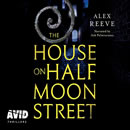
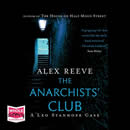
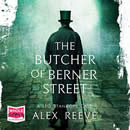
- Mr Standfast by John Buchan [read by Frederick Davidson]
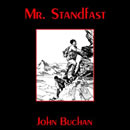
This is the third novel featuring Richard Hannay, which finds him on active service on Western Front. He is, however, recalled for some further espionage work - much against his will, and longing throughout to return to the good honest old-fashioned fighting. He is forced to pose as a pacifist to infiltrate a network of German spies (in England - and later elsewhere); in his own words: "To go into Germany as an anti-British Afrikaner was a stoutish adventure, but to lounge about at home talking rot was a very different-sized job."
As usual (it seems to me) his mission isn't really very clear. He establishes his credentials in a community of pacifists in Surrey, then rollicks around Scotland, (camping and living on his wits like a boy scout, and seemingly, even in his own estimation, achieving nothing), before making his way via London into Europe where he finally focusses on the destruction of an old enemy first encountered in The Thirty-Nine Steps.
Worth mentioning that (astonishingly) he falls in love with a (very) young and independently-minded woman. She is also involved in espionage, and determined to see it through, much against Hannay's way of thinking of the world and, more specifically, a delicate young thing's position in it. He comes round to it, and the book ends with both of them separately pursuing their contributions to the war effort - Hannay back to the fight on the Front. And all this from a man who "knew about as much of [women's] ways as [he] knew about the Chinese language".
I was a bit slow to recognise that the title of the book comes from a character in the Pilgrim's Progress - which I did read, but long ago. I should have realised sooner as Bunyan's book features large in this story. At first, I thought it was being handed between the characters, and discussed as a use for some kind of cipher, then again perhaps as a signal to recognise fellow spies. However, it seems that they all just took great comfort from the content, which gave them the heart to carry on in such a ghastly war.
I took a while to get used to the reader (not Christian Rodska - who read Greenmantle). Davidson's delivery was a real upper class drawl for the most part, which I never really took to for Hannay. Accents were adopted where appropriate (and these did include Glaswegian, Highland, Germanic, and earnest young folk), but we heard Hannay's South African accent only as part of his "disguise".
Posted on June 30, 2021 at 9:24 AM. Category: Books of the Month. | Comments (0)
